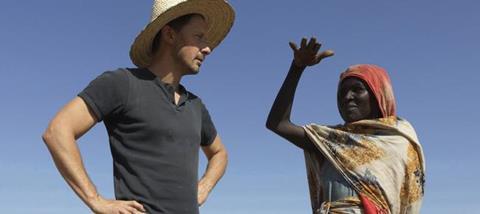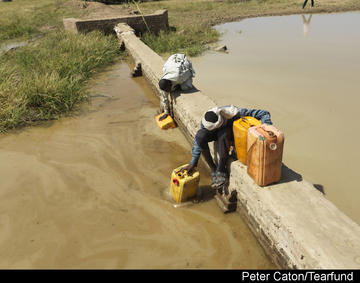
Six months ago I was sitting in 50-degree heat talking with Jumana in a village, in Chad, West Africa.
The country was - and still is - in the middle of a severe drought. In the above photo you can see Jumana explaining to me how tall her millet should have been. The crop had failed and Jumana told me her eldest daughter had died from hunger.
She also feared for her next eldest, Yasmin, 6, because, 'She wakes every night crying for food'.
During my time in the village, I frequently witnessed emotion, pain and a familiarity with suffering. Yet it’s Tearfund’s belief that even the very poorest people, like Jumana, do have something with which they can help themselves.
This goes against what often prompts us to respond - seeing the jeopardy of families like Jumana’s. So, is it realistic - even cruel - to believe people like Jumana do have potential to respond themselves? Is it in line with the Bible’s teaching?
Dependency
Jumana didn’t appear to have what she needed to beat the encroaching starvation. Or, if she did, she didn’t know she had it.
'The children often wake in the night asking for food', Jumana told me. 'So, when we eat our one meal we will reserve a bit and give it to them in the night. Before, I had many dreams, I used to be a very strong woman. But now I have been reduced to only thinking of how to feed my family.'
There are times when they have to call on our help to stay alive. But what they don't need - or want - is to become dependent on us.
Many of the crops around Jumana's village have died - withered by lack of rain. Ants, Jumana told me, are their current providers. 'All of the women in the village take food off ants – we do extreme things to survive'. I watched Jumana as she dug through hard soil to find an ants’ nest and steal seeds the insects had stored there during previous harvests.
In this sort of situation, families like Jumana’s need us in the UK to meet their immediate needs. Put bluntly, there are times when they have to call on our help to stay alive. But what they don't need - or want - is to become dependent on us.
And, after over a decade of travelling across Africa, Asia and Latin America, I believe more than ever that we must guard against unwittingly shutting down people’s ability to meet their own needs.
When fighting poverty goes wrong
Ten years ago I saw what appeared to be a brilliant community project in rural Uganda spectacularly fail. Goats had been given to needy families to raise, breed, sell - while also providing milk for their children. Yet, after two years, research showed that not a single family had moved any further out of poverty.
One recipient captured the problem when she said, 'your goat grew ill, and died. We tried to contact you, but couldn’t'. Because the goats had been given to the community based on the outsiders’ perception of their problems, the people had not truly 'owned' the idea that raising the animals could be a way out of poverty. So when one fell sick, they had not used their own God-given potential to address the difficulty: they were caught in a mind-set of dependency on others.
When a community works out the solution for themselves, it’s a different story. This is why Tearfund works with local churches across Africa, Asia and Latin America - often run by local (often very poor) lay pastors. This is a vital ingredient in communities believing they can be part of ending their own poverty.
Beyond hand-outs
Every single person alive today has enough God-given potential to challenge, with God’s help, whatever poverty or problem they face. But, poverty is very good at crushing not only the body but the soul also. In the words of one poor community, this is what it feels like: 'For a poor person everything is terrible - illness, humiliation, shame. We are cripples; we are afraid of everything; we depend on everyone. No one needs us. We are like garbage that everyone wants to get rid of.'
Every single person alive today has enough God-given potential to challenge, with God’s help, whatever poverty or problem they face.
Poverty closes down people’s potential to change things. Tearfund’s unique church-based approach says to poverty: stand back. In Jesus’ name we will unlock this community’s God-given potential.
For Jumana, in her drought-hit West African community, this approach sees the church mobilising her and her community to build a huge, long, earth-dyke (wall) in the middle of the desert next to their village - a task enabled by provision of food from Tearfund as and when necessary.
The dyke trapped the river’s huge annual overflow and forced the water deep into the parched soil. So deep that when I visited, in temperatures of 50 degrees Celsius, well over 150 acres of desert was green. This stood out, in contrast to dead crops everywhere else - an area brought to life by the village, through Tearfund, by diverting river overflow.
Crops are now growing there - promising an extra harvest when it’s most needed. That’s the good news.
But the great news is that, for the first time, enabled by the local church, Jumana’s community have seen their own ability to fight hunger.
Steve Adams is Tearfund’s Head of Global Brand and Communications
For more on Jumana and her village, please visit tearfund.org/disastersappeal
Click here to request a free copy of Premier Christianity magazine




























